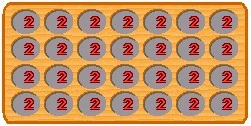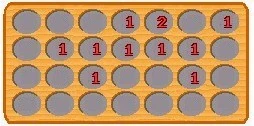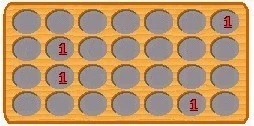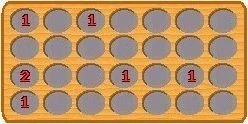Mr Mancala (talk | contribs) |
Mr Mancala (talk | contribs) (→Videos) Tag: sourceedit |
||
| (34 intermediate revisions by 5 users not shown) | |||
| Line 1: | Line 1: | ||
| − | ''Hawalis → [[Hawalis (Italiano)|Italian]]''. |
+ | ''Hawalis → [[Hawalis (Deutsch)|German]], [[Hawalis (Italiano)|Italian]], [[Hawalis (português)|Portuguese]]''. |
| Line 7: | Line 7: | ||
|''Other Names:'' Bao Kiarabu |
|''Other Names:'' Bao Kiarabu |
||
|- |
|- |
||
| − | |''First Description:'' W. H.<br/>Ingrams, 1921 |
+ | |''First Description:'' W. H.<br />Ingrams, 1921 |
|- |
|- |
||
|''Cycles:'' Two |
|''Cycles:'' Two |
||
| Line 15: | Line 15: | ||
|''Sowing:'' Multiple laps |
|''Sowing:'' Multiple laps |
||
|- |
|- |
||
| − | |''Region:'' Oman, Tanzania |
+ | |''Region:'' Oman, Tanzania<br />(Zanzibar) |
|} |
|} |
||
| − | '''Hawalis''' seems to be the only four-[[row]] [[mancala]] game found outside Africa except for some bizarre games from Yunnan (China). It is |
+ | '''Hawalis''' (الحواليـــس)seems to be the only four-[[row]] [[mancala]] game found outside Africa except for some bizarre games from Yunnan (China). It is from Oman, where the game is played by the Arab population, but not by Swahili speaking people, and also on Zanzibar, Tanzania, where it is known as [[Bao Kiarabu]] ("Arabian Board Game") and played by the Arabic people of the island who came from Oman. A two-[[row]] mancala game with seven pits per row is called "[[Al-Hawailah]]" in Qatar. |
The game was first described on Zanzibar by W. H. Ingrams in 1921 and in Oman by [[Alexander Johan de Voogt]] in 2003. De Voogt reported that Hawalis clubs in Ruwa, Mutrah, and Seeb conduct regular [[tournaments|championships]]. One of the strongest players was Dad Mohd. |
The game was first described on Zanzibar by W. H. Ingrams in 1921 and in Oman by [[Alexander Johan de Voogt]] in 2003. De Voogt reported that Hawalis clubs in Ruwa, Mutrah, and Seeb conduct regular [[tournaments|championships]]. One of the strongest players was Dad Mohd. |
||
[[Image:Mancalaproject2.jpg|thumb|220px|Hawalis tournament, Niederzissen (Germany) 2008]] |
[[Image:Mancalaproject2.jpg|thumb|220px|Hawalis tournament, Niederzissen (Germany) 2008]] |
||
| − | There was a small Hawalis tournament in Niederzissen, Germany, in May 2008. Nine boys (age 11-13) participated. |
+ | There was a small Hawalis tournament in Niederzissen, Germany, in May 2008. Nine boys (age 11-13) participated. |
The game was implemented by [[Arty Sandler]] for the [[Online Games|igGameCenter]] on April 20, 2009, where it can be played online against human opponents in real time. |
The game was implemented by [[Arty Sandler]] for the [[Online Games|igGameCenter]] on April 20, 2009, where it can be played online against human opponents in real time. |
||
| − | Hawalis is very similar to other games played all around Bantu speaking Africa. It is closely related to [[Njombwa]] (Mozambique), [[Lela]] (Malawi), [[Mulabalaba]] ( |
+ | Hawalis is very similar to other games played all around Bantu speaking Africa. It is closely related to [[Njombwa]] (Mozambique), [[Lela]] (Malawi), [[Mulabalaba]] (Zambia) and [[Muvalavala]] (Angola). |
== Rules== |
== Rules== |
||
| Line 39: | Line 39: | ||
Players take turns to move. |
Players take turns to move. |
||
| − | On his turn a player takes all the stones from one of his holes, which has at least two |
+ | On his turn a player takes all the stones from one of his holes, which has at least two stones, and then sows them anti-clockwise in the following holes all around his two rows. |
If the last stone falls into an occupied hole, its contents (including the last one played) are picked up and then distributed in another lap starting in the next hole. |
If the last stone falls into an occupied hole, its contents (including the last one played) are picked up and then distributed in another lap starting in the next hole. |
||
| − | If the last stone is dropped in an empty hole, the turn ends |
+ | If the last stone is dropped in an empty hole, the turn ends. |
If this empty hole was in the front row and the opposite hole of the opponent was occupied, the stones of this hole are captured and removed from the game. If the hole in the back row is occupied too, its contents are also taken. |
If this empty hole was in the front row and the opposite hole of the opponent was occupied, the stones of this hole are captured and removed from the game. If the hole in the back row is occupied too, its contents are also taken. |
||
[[Image:Hawal-draw.jpg|thumb|200px|"Pendulum" - A forced draw]] |
[[Image:Hawal-draw.jpg|thumb|200px|"Pendulum" - A forced draw]] |
||
| − | + | [[Singleton]]s can only be moved, if none of the player's holes contain two or more stones. However, it is not permitted to move such a stone, if the next hole is occupied. |
|
A player wins when he captures all stones of his adversary. |
A player wins when he captures all stones of his adversary. |
||
| − | The game is a draw, when the board position repeats |
+ | The game is a draw, when the board position repeats. |
| − | == |
+ | ==Example Games== |
| − | ''Miceu Tavares (Portugal) - Ralf Gering (Germany)'' |
+ | ''Miceu Tavares (Portugal) - Ralf Gering (Germany), June 11, 2009'' |
| − | 1. i (+4) L (+6); 2. d (+6) J (+6); 3. i (+2) H; |
+ | 1. i (+4) L (+6); 2. d (+6) J (+6); 3. i (+2) H; |
| − | 4. h N; 5. j D; 6. n K; 7. k (+2) E; 8. c E (+2);<br/> |
+ | 4. h N; 5. j D; 6. n K; 7. k (+2) E; 8. c E (+2);<br />9. d (+3) F (+1); 10. g I (+1); 11. a J; 12. h N; 13. e A; 14. f D; 15. b K (+1); 16. n E;<br />17. d (+1) F (+1); 18. f (+1) I (+1); 19. a L; 20. e M; 21. b D; 22. c E; 23. i (+1) N;<br />24. d (+3) J (+2); 25. e (+2) C; 26. l (+1) D; 27. m E; 28. n F; 29. a A; 30. b B; 31. c C;<br />32. d D; 33. e E; 34. l G; 35. m H; 36. b I; 37. c J; 38. d F; 39. e K (+1); 40. l L;<br />41. m M (+1); 42. b N; 43. c A; 44. d B; 45. e C; 46. h G (+1); 47. i H; 48. j D;<br />49. k (+1) E; 50. l F; 51. m G (+3); 52. f H; 53. g I; 54. h J; 55. i K (+1) |
| − | ''"miumiu" ( |
+ | ''"miumiu" (Poland) - Benedikt Rosenau (Germany), June 29, 2009'' |
| − | 1. h (+4) K (+6); 2. a |
+ | 1. h (+4) K (+6); 2. a I; 3. i (+4) C (+6); 4. k N (+6); 5. n M; 6. b (+2) G (+1); 7. g (+2) J (+2);<br />8. c K; 9. e F (+1); 10. f C; 11. g L; 12. h N; 13. k A! (infinite loop) |
The board position repeats after the 77th lap. A shifted position is even found after the 11th lap. |
The board position repeats after the 77th lap. A shifted position is even found after the 11th lap. |
||
| Line 81: | Line 81: | ||
''South to move wins! (Ralf Gering, 2008)'' |
''South to move wins! (Ralf Gering, 2008)'' |
||
| + | |||
| + | '''Problem 3''' |
||
| + | |||
| + | [[Image:Hawalis-P3.jpg]] |
||
| + | |||
| + | ''North to move!'' |
||
| + | |||
| + | '''Problem 4''' |
||
| + | |||
| + | [[Image:Hawalis-P4.jpg]] |
||
| + | |||
| + | ''South moves 1. What happens?'' |
||
| + | |||
| + | '''Problem 5''' |
||
| + | |||
| + | [[Image:Hawalis-P5.jpg]] |
||
| + | |||
| + | ''South moves 1. What happens?'' |
||
==See also== |
==See also== |
||
| Line 91: | Line 109: | ||
===Videos=== |
===Videos=== |
||
| − | *[http://www.youtube.com/watch?v= |
+ | *[http://www.youtube.com/watch?v=LO-HV5lhtiU "How to play Hawalis" by Sahar Al-Rimaal] |
| + | *[http://www.youtube.com/watch?v=_vwr08NC5FQ Hawalis advertisement] |
||
| + | *[http://www.youtube.com/watch?v=37ShtPSEuk8 Another Hawalis video by Sahar Al-Rimaal] |
||
| + | *[http://www.youtube.com/watch?v=OjCMNKfPR0g Hawalis in Ibri (2008)] |
||
| + | *[http://www.youtube.com/watch?v=4d5unXOrnEo Another video taken in Muscat (2007)] |
||
| + | *[http://www.youtube.com/watch?v=eh17PikXQls A game in progress, unknown location (2012)] |
||
===Photos=== |
===Photos=== |
||
| − | *[http://bp2.blogger.com/_EcArSSEgdhU/SD5-7L7Wl2I/AAAAAAAADEk/Alo1n3SMR_Y/s1600-h/DSCN2916.JPG |
+ | *[http://bp2.blogger.com/_EcArSSEgdhU/SD5-7L7Wl2I/AAAAAAAADEk/Alo1n3SMR_Y/s1600-h/DSCN2916.JPG Hawalis played near Al Araqi fort (May 2008)] |
| + | *[http://dun974.free.fr/oman/album/01-00-simple/p-ad20080709-13h12m30s-ejb.jpg.html Hawalis in a street of Muscat (July 9, 2008)] |
||
| − | *[http://www.worldofstock.com/slides/PRE12291.jpg Hawalis played at the beach (March 12, 2007, ©2009 Guenter Fischer and World of Stock. Unlicensed Use Prohibited)] |
||
| − | *[http://maurazos.ojodigital.net/albums/userpics/10001/PICT0313retocadaminimini.jpg Hawalis in Great Muscat (August 17, 2006)] |
||
*[http://www.flickr.com/photos/33653037@N00/375445348/ Hawalis in suburban Sohar (November 21, 2005)] |
*[http://www.flickr.com/photos/33653037@N00/375445348/ Hawalis in suburban Sohar (November 21, 2005)] |
||
| + | *[https://archive.is/20130629015444/www.cowi.com/SiteCollectionDocuments/cowi/en/menu/03.%20Projects/03.%20Transport/3.%20Airports/Images/Oman_4.jpg?wax-srv=XxkJJuGl3yWTY9OVp$imLg5E Hawalis on the beach of a little fishing village] |
||
| + | *[http://blog.travelpod.com/travel-photo/jomole/1/1299260713/mancala-in-the-sand.jpg/tpod.html "Mancala in the sand"] |
||
== References== |
== References== |
||
| + | ;Al-Mashani, A., Berger, J.-F., Borgi, F., Charpentier, V., Crassard, R. & Voogt, A. J. de.: [http://onlinelibrary.wiley.com/doi/10.1111/aae.12040/pdf Games on the Seashore of Salalah: The Discovery of Mancala Games in Dhofar, Sultanate of Oman]. In: ''Arabian Archaeology and Epigraphy'' 2014; 25: 115-120. |
||
| ⚫ | |||
| + | ;Hyde, T. |
||
| ⚫ | |||
| ⚫ | |||
| ⚫ | |||
| + | ;Ingrams, W. H. |
||
| ⚫ | |||
| ⚫ | |||
| ⚫ | |||
| + | ;Isitt, G. F. |
||
| ⚫ | |||
| ⚫ | |||
| ⚫ | |||
| + | ;Murray, H. J. R. |
||
| ⚫ | |||
| + | ;Ray, A. |
||
| + | : [http://www.muscatdaily.com/Archive/Oman/A-chance-to-try-your-hand-at-hawalis-20mx A Chance to Try Your Hands At Hawalis]. In: ''Muscat Daily'' February 3, 2013. |
||
| + | ;Romariz Santos Silva, E. |
||
| ⚫ | |||
| + | ;Salloum, H. |
||
| ⚫ | |||
| + | ;Voogt, A. J. de |
||
| ⚫ | |||
==Solutions== |
==Solutions== |
||
| Line 112: | Line 146: | ||
'''Problem 1''' |
'''Problem 1''' |
||
| − | 5! (x1 a) |
+ | 5! (x1 a) 10; 2 (x1) 11; 3 (x1) 12; 4 (x1) 13; 6 (x3) 8; 7 9; 5 10; 8 11; 9 12; 10 13; 11 6; 12 7; 13 8; 14 9; 1 10; 2 11; 3 12; 4 14; 6 (x1) 13; 5 14 (x1); 6 (x1). (41 moves) |
| − | a) |
+ | a) 2? (x3) 4 (x1); 5 (x1) 3; 6 11; 7 12; 8 13; 9 14; 10 1; 11 2; 12 8; 13 9; 14 6 (x1) and North wins. |
'''Problem 2''' |
'''Problem 2''' |
||
| − | 13 |
+ | 13 2; 14 3; 1 8; 6 9; 7 10; 8 11; 9 12; 10 13; 11 14; 12 1; 13 2; 14 4; 2 (x1) 3; 3 (x1). (27 moves) |
| + | |||
| + | '''Problem 3''' |
||
| + | 13! 7; 14 8; 1 9; 2 10; 3(x3) 11; 13 12; 14 13; 1 14; 4(x1) 1; 5(x1) - South has no tempi. |
||
| + | |||
| + | But not: 14(x3) 4; 12 2; 13 3; 1 5(x1); 14 6(x1) - North lost all tempi. |
||
| + | |||
| + | '''Problem 4''' |
||
| + | |||
| + | An infinite loop. Position shifts by one pit after 7 laps. Periodicity = 98 (discovered by Miceu Tavares and Ralf Gering on July 2, 2009) |
||
| + | |||
| + | '''Problem 5''' |
||
| + | |||
| + | An infinite loop. Position shifts by two pits after 11 laps. Periodicity = 77 (discovered by Benedikt Rosenau on June 29, 2009) |
||
==Copyright== |
==Copyright== |
||
| − | ''© Wikimanqala.<br /> |
+ | ''© [[Wikimanqala]].<br />'' |
| − | By: Víktor Bautista i Roca & Ralf Gering<br /> |
+ | By: [[Víktor Bautista i Roca]] & [[User:Mr Mancala|Ralf Gering]]<br /> |
| − | Under the [http://creativecommons.org/licenses/by-sa/2.5/ CC by-sa 2.5 license]. |
+ | Under the [http://creativecommons.org/licenses/by-sa/2.5/ CC by-sa 2.5 license]. |
[[Category:Traditional_Mancala_Games]] |
[[Category:Traditional_Mancala_Games]] |
||
[[Category:Asia]] |
[[Category:Asia]] |
||
| + | [[Category:Four Rows]] |
||
Latest revision as of 08:54, 7 December 2016
Hawalis → German, Italian, Portuguese.
| Hawalis |
| Other Names: Bao Kiarabu |
| First Description: W. H. Ingrams, 1921 |
| Cycles: Two |
| Ranks: Four |
| Sowing: Multiple laps |
| Region: Oman, Tanzania (Zanzibar) |
Hawalis (الحواليـــس)seems to be the only four-row mancala game found outside Africa except for some bizarre games from Yunnan (China). It is from Oman, where the game is played by the Arab population, but not by Swahili speaking people, and also on Zanzibar, Tanzania, where it is known as Bao Kiarabu ("Arabian Board Game") and played by the Arabic people of the island who came from Oman. A two-row mancala game with seven pits per row is called "Al-Hawailah" in Qatar.
The game was first described on Zanzibar by W. H. Ingrams in 1921 and in Oman by Alexander Johan de Voogt in 2003. De Voogt reported that Hawalis clubs in Ruwa, Mutrah, and Seeb conduct regular championships. One of the strongest players was Dad Mohd.
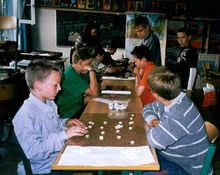
Hawalis tournament, Niederzissen (Germany) 2008
There was a small Hawalis tournament in Niederzissen, Germany, in May 2008. Nine boys (age 11-13) participated.
The game was implemented by Arty Sandler for the igGameCenter on April 20, 2009, where it can be played online against human opponents in real time.
Hawalis is very similar to other games played all around Bantu speaking Africa. It is closely related to Njombwa (Mozambique), Lela (Malawi), Mulabalaba (Zambia) and Muvalavala (Angola).
Rules[]
Hawalis is played on a board, which has four rows of seven holes. Each player controls the two rows on his side.
At the beginning there are two stones in each hole.
Initial Position
Players take turns to move.
On his turn a player takes all the stones from one of his holes, which has at least two stones, and then sows them anti-clockwise in the following holes all around his two rows.
If the last stone falls into an occupied hole, its contents (including the last one played) are picked up and then distributed in another lap starting in the next hole.
If the last stone is dropped in an empty hole, the turn ends.
If this empty hole was in the front row and the opposite hole of the opponent was occupied, the stones of this hole are captured and removed from the game. If the hole in the back row is occupied too, its contents are also taken.

"Pendulum" - A forced draw
Singletons can only be moved, if none of the player's holes contain two or more stones. However, it is not permitted to move such a stone, if the next hole is occupied.
A player wins when he captures all stones of his adversary.
The game is a draw, when the board position repeats.
Example Games[]
Miceu Tavares (Portugal) - Ralf Gering (Germany), June 11, 2009
1. i (+4) L (+6); 2. d (+6) J (+6); 3. i (+2) H;
4. h N; 5. j D; 6. n K; 7. k (+2) E; 8. c E (+2);
9. d (+3) F (+1); 10. g I (+1); 11. a J; 12. h N; 13. e A; 14. f D; 15. b K (+1); 16. n E;
17. d (+1) F (+1); 18. f (+1) I (+1); 19. a L; 20. e M; 21. b D; 22. c E; 23. i (+1) N;
24. d (+3) J (+2); 25. e (+2) C; 26. l (+1) D; 27. m E; 28. n F; 29. a A; 30. b B; 31. c C;
32. d D; 33. e E; 34. l G; 35. m H; 36. b I; 37. c J; 38. d F; 39. e K (+1); 40. l L;
41. m M (+1); 42. b N; 43. c A; 44. d B; 45. e C; 46. h G (+1); 47. i H; 48. j D;
49. k (+1) E; 50. l F; 51. m G (+3); 52. f H; 53. g I; 54. h J; 55. i K (+1)
"miumiu" (Poland) - Benedikt Rosenau (Germany), June 29, 2009
1. h (+4) K (+6); 2. a I; 3. i (+4) C (+6); 4. k N (+6); 5. n M; 6. b (+2) G (+1); 7. g (+2) J (+2);
8. c K; 9. e F (+1); 10. f C; 11. g L; 12. h N; 13. k A! (infinite loop)
The board position repeats after the 77th lap. A shifted position is even found after the 11th lap.
Endgame Problems[]
Problem 1
South to move wins! Look for the shortest solution. (Ralf Gering, 2008)
Problem 2
South to move wins! (Ralf Gering, 2008)
Problem 3
North to move!
Problem 4
South moves 1. What happens?
Problem 5
South moves 1. What happens?
See also[]
General Information[]
- Hawalis on BoardGameGeek
- Simulation script showing an infinite loop in Hawalis (created by Arty Sandler)
Online Play[]
Videos[]
- "How to play Hawalis" by Sahar Al-Rimaal
- Hawalis advertisement
- Another Hawalis video by Sahar Al-Rimaal
- Hawalis in Ibri (2008)
- Another video taken in Muscat (2007)
- A game in progress, unknown location (2012)
Photos[]
- Hawalis played near Al Araqi fort (May 2008)
- Hawalis in a street of Muscat (July 9, 2008)
- Hawalis in suburban Sohar (November 21, 2005)
- Hawalis on the beach of a little fishing village
- "Mancala in the sand"
References[]
- Al-Mashani, A., Berger, J.-F., Borgi, F., Charpentier, V., Crassard, R. & Voogt, A. J. de.
- Games on the Seashore of Salalah: The Discovery of Mancala Games in Dhofar, Sultanate of Oman. In: Arabian Archaeology and Epigraphy 2014; 25: 115-120.
- Hyde, T.
- De Ludis Orientalibus Libri Duo. Oxford (UK) 1694, 232.
- Ingrams, W. H.
- Zanzibar: Its History and Its People. Frank Cass & Co., London (UK) 1921, 257.
- Isitt, G. F.
- Vikings in the Persian Gulf. In: Journal of the Royal Asiatic Society 2007; 17: 389-406.
- Murray, H. J. R.
- A History of Board-Games Other Than Chess. Oxford (UK) 1952, 207-208.
- Ray, A.
- A Chance to Try Your Hands At Hawalis. In: Muscat Daily February 3, 2013.
- Romariz Santos Silva, E.
- Jogos de quadrícula do tipo mancala com especial incidência nos praticados em Angola. Lisboa (Portugal) 1995.
- Salloum, H.
- Muscat Enwraps the Past with the Present. In: The Jordan Times 2003 (April 27).
- Voogt, A. J. de
- Hawalis in Oman: A First Account of Expertise and Dispersal of Four-row Mancala in the Middle East. In: Board Game Studies 2003; 6: 95-98.
Solutions[]
Problem 1
5! (x1 a) 10; 2 (x1) 11; 3 (x1) 12; 4 (x1) 13; 6 (x3) 8; 7 9; 5 10; 8 11; 9 12; 10 13; 11 6; 12 7; 13 8; 14 9; 1 10; 2 11; 3 12; 4 14; 6 (x1) 13; 5 14 (x1); 6 (x1). (41 moves)
a) 2? (x3) 4 (x1); 5 (x1) 3; 6 11; 7 12; 8 13; 9 14; 10 1; 11 2; 12 8; 13 9; 14 6 (x1) and North wins.
Problem 2
13 2; 14 3; 1 8; 6 9; 7 10; 8 11; 9 12; 10 13; 11 14; 12 1; 13 2; 14 4; 2 (x1) 3; 3 (x1). (27 moves)
Problem 3 13! 7; 14 8; 1 9; 2 10; 3(x3) 11; 13 12; 14 13; 1 14; 4(x1) 1; 5(x1) - South has no tempi.
But not: 14(x3) 4; 12 2; 13 3; 1 5(x1); 14 6(x1) - North lost all tempi.
Problem 4
An infinite loop. Position shifts by one pit after 7 laps. Periodicity = 98 (discovered by Miceu Tavares and Ralf Gering on July 2, 2009)
Problem 5
An infinite loop. Position shifts by two pits after 11 laps. Periodicity = 77 (discovered by Benedikt Rosenau on June 29, 2009)
Copyright[]
© Wikimanqala.
By: Víktor Bautista i Roca & Ralf Gering
Under the CC by-sa 2.5 license.
